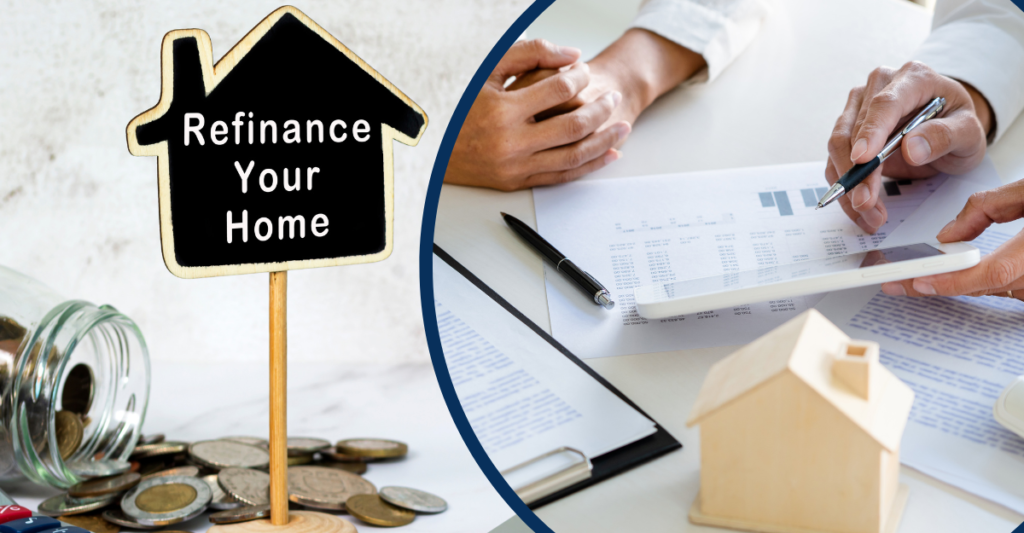Refinancing a rental property can be a strategic move for property owners looking to lower their mortgage rates, cash out equity for investments, or change their loan terms. This process, while similar to refinancing a primary residence, involves distinct considerations, given the nature of rental properties as investments.
Below, we delve into the essentials of how to navigate the refinancing process for rental properties, providing insights, recommendations, and the latest updates to ensure a smooth and beneficial refinancing journey.
Understanding the Basics of Rental Property Refinancing
Refinancing a rental property involves replacing your current mortgage with a new one, typically with different terms and interest rates. This process can offer numerous benefits, including lower monthly payments, shorter loan terms, or the opportunity to cash out equity.
Before diving into refinancing, it’s crucial to understand the eligibility criteria, which can be stricter than for a primary residence. Lenders often require a higher credit score, lower loan-to-value (LTV) ratios, and solid proof of rental income. It’s also important to consider the costs associated with refinancing, such as appraisal fees, closing costs, and potential prepayment penalties on your current mortgage.
The first step in refinancing your rental property is to assess your financial goals. Are you looking to lower your interest rate, change the loan term, or cash out equity? Your objectives will guide the refinancing process and help you choose the right loan type. It’s also wise to evaluate your current mortgage terms, property value, and the equity you’ve built up. Knowing these details will help you understand the refinancing options available to you.
When considering refinancing, research is key. Compare rates from multiple lenders to find the best deal. Lenders’ requirements can vary significantly, so it’s beneficial to shop around. Additionally, consider the timing of your refinance. Market conditions can affect interest rates, so refinancing during a period of low rates can maximize your benefits. Keep an eye on economic indicators and consult with mortgage professionals to choose the optimal time for refinancing.
Qualifying for a Rental Property Refinance
The qualification criteria for refinancing a rental property are more stringent than for a primary residence. Lenders view rental properties as higher risk, so they typically require a higher credit score, for the best interest rates. Your debt-to-income (DTI) ratio is also crucial; lenders prefer a DTI ratio lower than 36%, including your existing mortgages and other debts.
Lenders will closely examine your rental income to ensure it’s stable and sufficient to cover the new mortgage payments. Be prepared to provide documentation such as tax returns, lease agreements, and bank statements. Some lenders may apply a vacancy factor, typically 25%, to account for potential rental income loss between tenants. This means they’ll consider only 75% of your rental income as effective income, which could impact your qualification criteria.
Equity is another important factor in qualifying for a refinance. Most lenders require an LTV ratio of 75% or lower, meaning you need to have at least 25% equity in your property. If your LTV ratio is higher, you may still qualify for refinancing, but likely at less favorable terms. An appraisal will be required to determine your property’s current value and, consequently, your equity. This appraisal can be a significant hurdle if the market values have decreased since your purchase.
Choosing the Right Refinance Option
There are several refinance options available for rental property owners, each suited to different needs. A rate-and-term refinance allows you to adjust the interest rate and term of your loan without changing the loan balance, ideal for lowering monthly payments or changing the payoff timeline.
A cash-out refinance, on the other hand, increases your loan amount to tap into your property’s equity, providing funds for renovations, buying additional properties, or other investments. Fixed-rate mortgages offer stability with a consistent interest rate and monthly payment for the life of the loan, making budgeting easier. Adjustable-rate mortgages (ARMs) may start with lower interest rates than fixed-rate loans but can adjust over time, which could increase your payments.
When choosing between these options, consider your long-term financial goals, the current interest rate environment, and how long you plan to hold the property. Loan terms are also a critical decision point. Shorter-term loans, like 15 or 20 years, often have lower interest rates but higher monthly payments. Longer-term loans, such as 30 years, have lower monthly payments but result in higher total interest paid over the life of the loan. Your choice should align with your cash flow needs and investment strategy.
Navigating the Refinancing Process
The refinancing process for a rental property is comprehensive and requires careful planning. Start by gathering all necessary financial documents, including tax returns, W-2s, 1099s, lease agreements, and a current mortgage statement. These documents will be crucial for your loan application and for verifying your income and expenses.
Next, obtain a property appraisal to determine your rental property’s current market value. This appraisal is a key factor in determining your LTV ratio and the amount you can borrow. Be prepared for the possibility that the appraisal may come in lower than expected, which could affect your refinancing options.

Finally, compare offers from multiple lenders to ensure you’re getting the best deal. Pay attention to interest rates, closing costs, and loan terms. Don’t hesitate to negotiate with lenders or ask for better terms. Once you’ve chosen a lender, the closing process will involve signing a new loan agreement and paying any associated closing costs. It’s important to understand these costs upfront and factor them into your decision-making process.
Understanding the Financial Implications
Refinancing a rental property can have significant financial implications, both positive and negative. On the positive side, refinancing can lead to lower monthly payments, reduced interest costs over the life of the loan, or access to cash for investment purposes. These benefits can improve your cash flow and help you expand your real estate portfolio.
However, refinancing also comes with costs, including appraisal fees, loan origination fees, and closing costs. These expenses can add up, so it’s important to calculate whether the savings from refinancing outweigh the costs. Additionally, taking out equity from your property increases your loan balance and could result in higher monthly payments, depending on the terms of your new mortgage.
Tax implications are another important consideration. Mortgage interest is generally tax-deductible for rental properties, but the specifics can vary based on your situation and the amount of interest you’re paying. It’s wise to consult with a tax professional to understand how refinancing will affect your tax situation.
Staying Informed on Market Trends and Regulations
The real estate market and lending regulations are constantly evolving, which can impact your refinancing options and decisions. Interest rates fluctuate based on economic conditions, so it’s important to stay informed about trends and forecasts. Refinancing when rates are low can save you a significant amount on interest payments.
Regulations regarding rental properties and refinancing can also change. These changes could affect your eligibility for refinancing, the documentation required, or the tax implications of your loan. Keeping up with these regulations is essential to ensure compliance and to take advantage of any new opportunities for financing.
Networking with other real estate investors and professionals can provide valuable insights into the market and lending practices. Real estate investment groups and online forums are great resources for sharing experiences and advice. Additionally, working with a mortgage broker or financial advisor who specializes in rental properties can help you navigate the complexities of refinancing.
FAQs
What are the benefits of refinancing a rental property?
Refinancing a rental property involves taking out a new loan to pay off your existing mortgage. This new loan typically has different terms, such as a lower interest rate or a different loan term, which can provide financial benefits to the property owner.
What criteria do lenders consider when refinancing a rental property?
Lenders typically look at the borrower’s credit score, debt-to-income ratio, the property’s loan-to-value ratio, and the stability and amount of rental income the property generates.
Can I cash out equity when refinancing a rental property?
Yes, a cash-out refinance allows you to take out a loan for more than you owe on the property and receive the difference in cash, which can be used for property improvements, purchasing another property, or other investments.
What are the risks of refinancing a rental property?
Risks include extending the life of your loan, increasing your total interest cost, facing high closing costs, and potential tax implications. It’s important to analyze whether the refinancing benefits outweigh these risks.
How do I qualify for a rental property refinance?
To qualify, you typically need a good credit score, a low debt-to-income ratio, sufficient equity in the property, and proof of stable rental income.
What is the difference between rate-and-term refinancing and cash-out refinancing?
Rate-and-term refinancing changes the interest rate and/or term of your loan without increasing the loan amount, whereas cash-out refinancing increases your loan amount, allowing you to cash out your home equity.
How does a fixed-rate mortgage differ from an adjustable-rate mortgage in refinancing?
A fixed-rate mortgage keeps the same interest rate throughout the life of the loan, providing payment stability. An adjustable-rate mortgage may start with a lower rate that can change over time, potentially leading to higher future payments.
What are the costs associated with refinancing a rental property?
Costs can include appraisal fees, origination fees, application fees, title insurance, and other closing costs. It’s important to calculate these costs to determine if refinancing is financially beneficial.
How does the current market value of my property affect refinancing?
The market value, determined by an appraisal, affects your loan-to-value ratio, which is a key factor in determining your qualification for refinancing and the terms you can secure.
How long does the refinancing process take for a rental property?
The process can take anywhere from a few weeks to several months, depending on the lender, the complexity of your financial situation, and the property itself.
Can I refinance a rental property with bad credit?
While possible, refinancing with bad credit may result in less favorable terms, such as a higher interest rate. Some lenders specialize in loans for borrowers with lower credit scores.
How does refinancing affect my taxes?
Refinancing can affect your taxes, particularly regarding the deductibility of mortgage interest. Consulting with a tax professional is recommended to understand the specific implications of your situation.
Should I refinance my rental property now or wait for better rates?
This decision depends on current market rates, your financial situation, and your investment goals. It may be beneficial to refinance when rates are low, but consider consulting with a financial advisor.
Can I refinance a rental property more than once?
Yes, there’s no limit to how many times you can refinance a rental property, but it’s important to consider the costs and benefits each time to ensure it align with your financial goals.
What should I do if my refinancing application is denied?
If your application is denied, ask the lender for the specific reasons. You may need to improve your credit score, decrease your debt-to-income ratio, or increase the property’s income. Alternatively, consider applying with a different lender.
Conclusion
Refinancing a rental property can be a powerful strategy for property owners looking to optimize their investment. By understanding the basics, qualifying criteria, and choosing the right refinance option, you can navigate the process effectively.
It’s important to consider the financial implications, stay informed on market trends and regulations, and seek professional advice when needed. With careful planning and execution, refinancing your rental property can lead to significant financial benefits and help you achieve your long-term investment goals.

